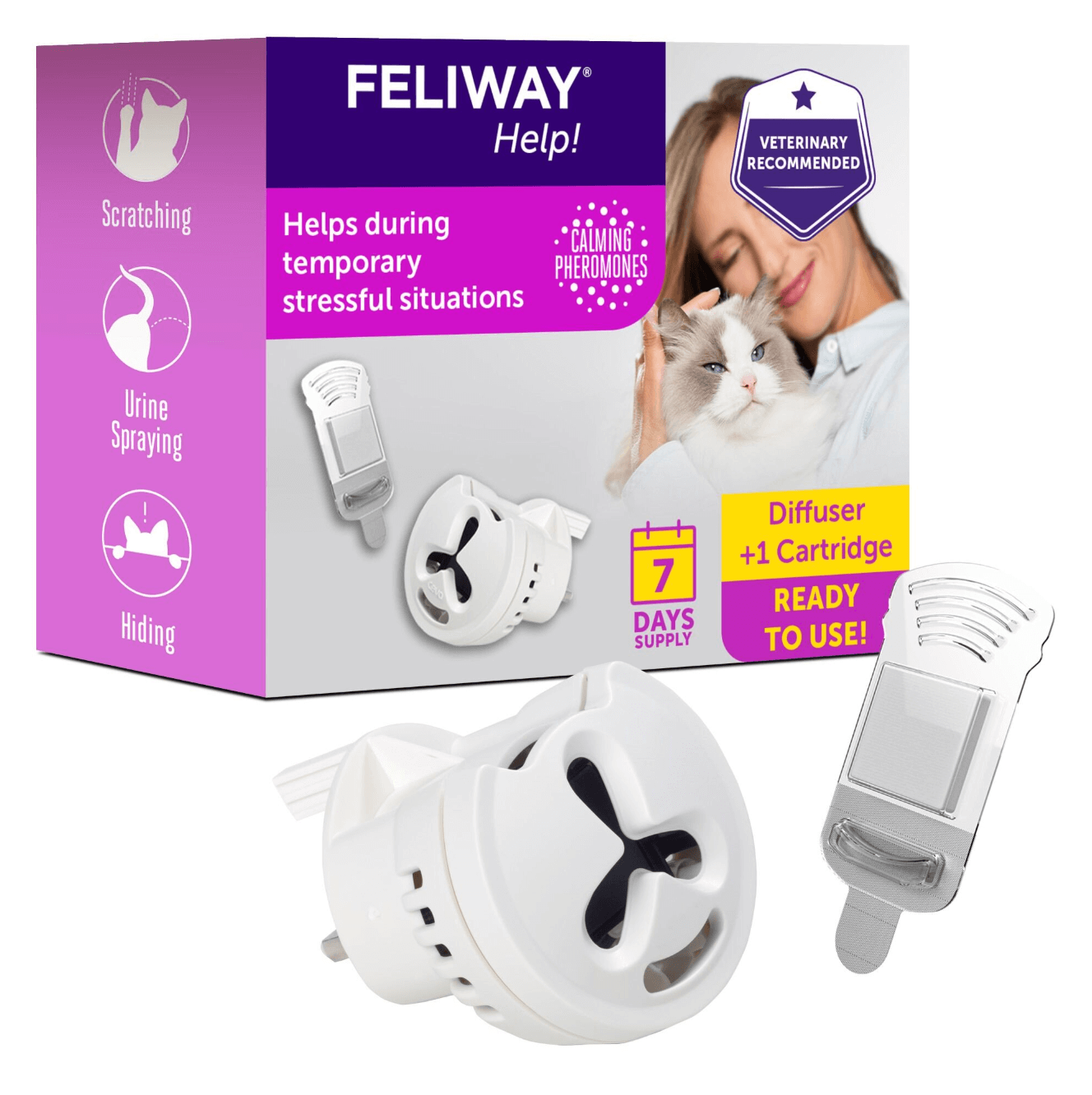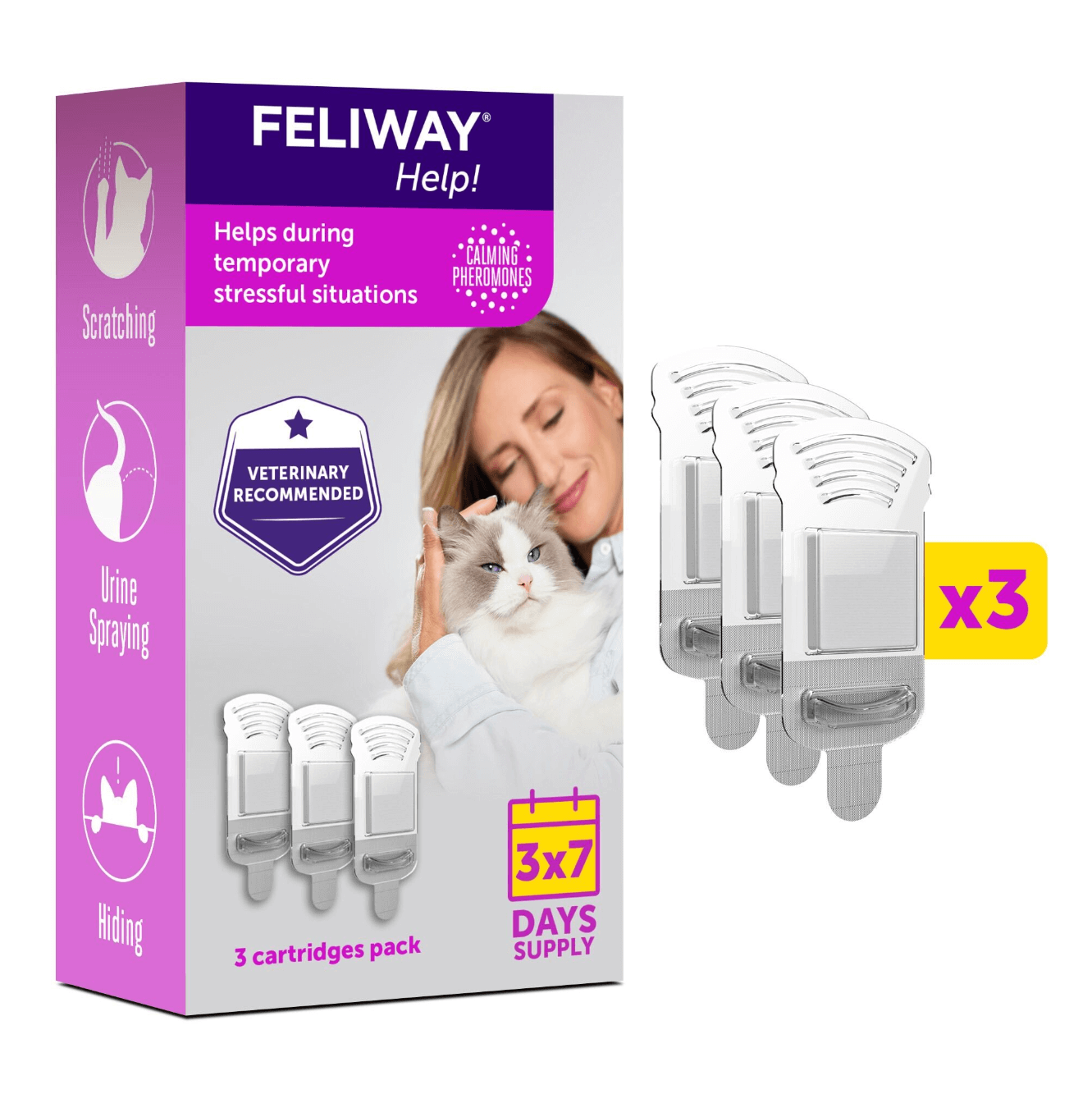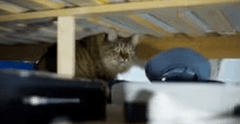HELPING A CAT THAT HIDES ALOT
4 Tips To Reassure A Hiding Cat
-
Try to understand why your cat is hiding
- Recent changes at home (e.g. new furniture, redecorating, moving home)?
- Visitors, new family member, new pet at home?
- Competition or tension with another cat?
- All of these factors are potential sources of stress for your cat. A cat that is feeling stressed is more likely to hide.
-
Reduce your cat's hiding with FELIWAY Optimum
- Optimum releases "serenity messages" to create a safe and secure environment at home
- Visible improvements in the first week of use
- Use continuously for at least one month
- Refill every month as needed
-
Cats need to hide
- Provide multiple cat hiding spots (cardboard boxes, baskets, open cupboards etc)
- Make sure these places are easily accessible areas whenever your cat may choose to use them. Remember cats like elevated areas!
- Cats like their space; respect their decision to hide away and leave them undisturbed
-
Consult your vet
- In some cases, an underlying illness may be causing your cat to hide, such as pain
- If signs persist, consult your vet
We recommend:
-
Seen on TV
-
Recommended by vets
-
+ 1 million Facebook likes
-
+ 25 years of expertise
TESTIMONIALS
Find out how FELIWAY helped these cats hide less:

Moxxi - Feliway helped us move house with her twice, and even now we're settled down it helps her out because even though she acts brave when she hunts spiders, she's a little scaredy cat whenever the doorbell goes off. Since using Feliway though, she doesn't hide in places we can't find her and even greets our friends now!

Tala & Nadja - Tala has been an only cat for almost 7 years, after a brief stint with another cat when she was a kitten. Recently we got Nadja to keep her company and, thanks to Feliway Optimum, their introductions have been super smooth! We were expecting it to take months but by week 2 Tala was already curious and wanting to spend time with her new sister. It's still only been a month that they have been together, but they sleep next to each other and love to play chase with each other around the house.Tala can be a bit anxious, so she is really glad Feliway has helped to stop her hiding and help her embrace her new companion! She also loves the Happy Snacks if she's feeling a little more on edge than usual. She is the best cat and thanks to Feliway Optimum she now gets a friend to help her feel more confident too.

Issac - Issac was a rescue after his owner sadly passed away. When Issac arrived, we did not see him for 2 weeks, eating at night only and hiding away. Usually in our wardrobe on top of jackets as far back as possible. After 4 weeks using Feliway optium he is now trusting my wife and starting to get his voice back.

Dutchess - Dutchess was a rescue, at 9 months she had, already had one litter and was pregnant again. She had a really rough start to life. She was super scared when I got her hiding in the bathroom, feliway was recommend by my vet, it was the best thing ever!! it helped Dutchess to settle and stay calm. I would highly recommend. As you can can see in picture Dutchess is happy, settled and chilled now
Frequently asked questions:
FREQUENTLY ASKED QUESTIONS - CAT HIDING
Find quick, expert-backed answers to the most common questions about FELIWAY, cat behaviour, and how to create a stress-free environment for your feline friend.
WHY DO CATS HIDE?
While periodic hiding is normal for cats, excessive hiding is not. If your cat is hiding all day, it could be a sign that they are stressed and trying to cope.
Many things can cause your cat to hide:
- People: cats commonly hide from visitors
- Noises: cats may hide if they are scared by sudden or loud noises
- Recent changes at home: adding new furniture, remodelling, new baby in the family etc.
- Another pet in the home (or in the neighbourhood): cats don’t like sharing resources like their litterbox, food bowls, etc… this may cause one cat to hide
- Several medical conditions cause pain or discomfort and may be a reason for your cat to hide. If your cat spends most of its time hidden, or if you've noticed an increase in the amount of time they spend hiding, consult your vet.
When your cat is hiding, leave them be, as they are communicating that they want alone time. Stroking them when they are trying to hide could unintentionally increase their level of stress. Wait for your cat to come to you and ask for attention.
Reward your cat with food or petting when they are able to cope without hiding. This positive reinforcement may encourage them.
Try to work out what is worrying them to help them feel more confident and spend more time out of hiding.
If you have several cats, give each cat their own food bowl, water bowl, litter box, etc. Put these in separate areas to avoid tension caused by competition.
Using FELIWAY Optimum will help keep your cat's sense of security and their interest in interacting with you.
HOW DO I HELP MY NEW CAT TO COME OUT OF HIDING?
If you’ve recently adopted a new cat into your home, they may need time to settle in before they feel comfortable enough to come out of hiding. The best way to help your new cat to settle in is to create a calm and safe environment. Start by minimising any loud noises and sudden movements that could startle your cat. Next, offer treats or their favourite food near their hiding spot, gradually moving it closer to you over time to encourage them to come out on their own terms. You should also try speaking softly to reassure your new cat that everything is okay.
Many cat parents have successfully used Happy Snack by FELIWAY to build trust with their new feline friend.
And remember, patience is key! It's important to let your cat set the pace and come out of hiding when they’re ready. For help creating a calm and safe environment, we recommend trying our FELIWAY® Optimum diffuser kit. For more tips and advice on getting a new cat out of hiding, read our full guide here.
HOW LONG DOES IT TAKE A NEW CAT TO STOP HIDING?
The time it takes for a new cat to stop hiding tends to vary based on their personality and past experiences. Typically, it can take a few days for a cat to feel comfortable enough to come out of hiding in a new environment, and up to several weeks to be fully settled in.
To help this process along, provide a quiet, safe space with everything your new cat needs, and use a FELIWAY® Optimum diffuser to ease any feelings of stress and help them settle in. Avoid forcing your cat out of their hiding spot and instead introduce yourself gradually with gentle interactions. Sitting quietly nearby can help, laying out treats a little distance away for your cat to investigate. Similarly, you could try playing with a favorite toy. Fishing rod toys are great for this as they create a natural distance between you and your cat while still playing together.
As always, patience and a calm, reassuring presence are key to helping a new cat adjust and feel secure enough to explore their new home and interact with their new human!
WHY IS MY CAT HIDING UNDER THE BED?
Cats hide under the bed for various reasons, often seeking a safe, quiet space when they feel stressed, scared, or unwell. This behaviour can be brought on by changes in the environment, loud noises, visitors, or even other pets. Providing a reassuring environment – such as with a FELIWAY® Optimum diffuser – and ensuring your cat has a comfortable hiding place can help. If your cat’s hiding behaviour persists or is accompanied by other symptoms, consulting a veterinarian is strongly recommended.
WHY IS MY CAT HIDING HER KITTENS FROM ME?
Your cat is very likely hiding her kittens from you as a natural maternal instinct. Cats want to keep their kittens in a safe, clean, quiet space in order to help their chances of survival. Even in a safe home environment, this instinct can drive a mother cat to seek secluded spots she thinks are secure for her offspring.
Pregnant cats – technically known as Queens! – will often start looking for a suitable place to have their nest a couple of weeks before the kittens arrive. You can help by providing some warm, comfortable options in quiet areas of your home for your cat to choose from. For instance, you could try a laundry basket, under a bed, or behind some furniture. Then, once the kittens have arrived, keep their chosen spot as quiet and safe as possible.
Don’t forget, as exciting as it is to see your cat’s new kittens, it’s important to give them their privacy. Keep children, visitors, and other pets away, and keep an eye on the kittens from a distance. After two weeks or so, you may start to see them emerge!





































